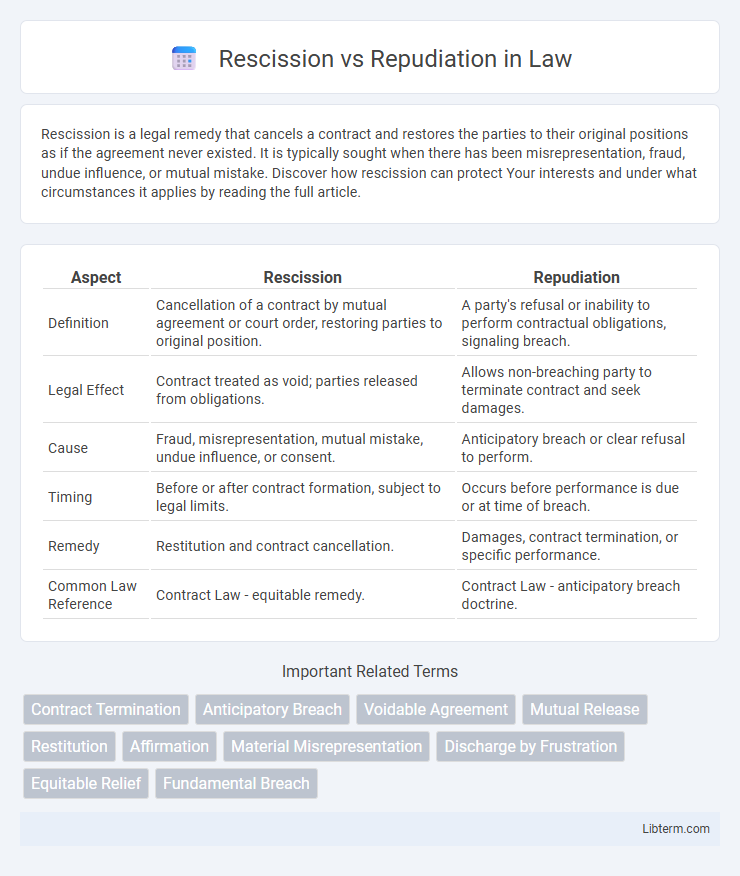Rescission is a legal remedy that cancels a contract and restores the parties to their original positions as if the agreement never existed. It is typically sought when there has been misrepresentation, fraud, undue influence, or mutual mistake. Discover how rescission can protect Your interests and under what circumstances it applies by reading the full article.
Table of Comparison
| Aspect | Rescission | Repudiation |
|---|---|---|
| Definition | Cancellation of a contract by mutual agreement or court order, restoring parties to original position. | A party's refusal or inability to perform contractual obligations, signaling breach. |
| Legal Effect | Contract treated as void; parties released from obligations. | Allows non-breaching party to terminate contract and seek damages. |
| Cause | Fraud, misrepresentation, mutual mistake, undue influence, or consent. | Anticipatory breach or clear refusal to perform. |
| Timing | Before or after contract formation, subject to legal limits. | Occurs before performance is due or at time of breach. |
| Remedy | Restitution and contract cancellation. | Damages, contract termination, or specific performance. |
| Common Law Reference | Contract Law - equitable remedy. | Contract Law - anticipatory breach doctrine. |
Understanding Rescission: Definition and Context
Rescission is a legal remedy that cancels a contract, restoring the parties to their original positions before the agreement was made. It typically occurs when there is misrepresentation, fraud, undue influence, or mutual mistake, making the contract voidable. Understanding rescission involves recognizing its purpose to undo contractual obligations and prevent unjust enrichment, differentiating it from repudiation which is a breach indicating refusal to perform.
What is Repudiation? Key Legal Concepts
Repudiation refers to a party's clear refusal or inability to perform their contractual obligations, signaling an intention not to be bound by the contract terms. Key legal concepts include anticipatory breach, where one party indicates in advance they will not fulfill the contract, and breach of contract, which allows the non-breaching party to seek remedies. Courts often assess the seriousness of repudiation to determine whether it justifies termination or damages.
Core Differences Between Rescission and Repudiation
Rescission involves the mutual cancellation of a contract, restoring both parties to their original positions as if the agreement never existed, often due to factors like misrepresentation or mistake. Repudiation occurs when one party clearly indicates an unwillingness or inability to perform their contractual obligations, allowing the innocent party to terminate the contract and seek damages. The core difference lies in rescission being a consensual act aimed at voiding the contract, while repudiation is a breach that permits termination and legal remedies.
Legal Grounds for Rescinding a Contract
Legal grounds for rescinding a contract include misrepresentation, fraud, duress, undue influence, mistake, and illegality. Rescission nullifies the contract from inception, restoring parties to their original positions. Unlike repudiation, which involves a party's refusal to perform contractual obligations, rescission is grounded in defects affecting the contract's validity.
Circumstances that Constitute Repudiation
Repudiation occurs when a party clearly and unequivocally indicates an unwillingness or inability to perform their contractual obligations, either through explicit statements or conduct that makes performance impossible. Circumstances constituting repudiation include outright refusal to perform, actions that prevent performance, or conduct demonstrating intention to breach the contract in the future. Courts assess repudiation based on the objective interpretation of the party's words or behavior within the contractual context.
Remedies Available for Rescission
Rescission allows parties to undo a contract and restore them to their original positions, primarily through the return of any exchanged benefits. Remedies for rescission include restitution, which requires the return of goods, property, or money to prevent unjust enrichment. Courts may also grant equitable relief to ensure fair cancellation of the contract without awarding damages.
Consequences of Repudiation in Contract Law
Repudiation in contract law occurs when one party clearly indicates an intention not to perform their contractual obligations, allowing the innocent party to terminate the contract and sue for damages. This breach immediately discharges the non-breaching party from further performance, providing legal grounds to seek remedies such as compensation for losses incurred. Unlike rescission, which aims to nullify the contract and restore parties to their original positions, repudiation emphasizes enforcing contractual rights and claiming damages for breach.
Case Law Examples: Rescission vs Repudiation
In the case of *Hong Kong Fir Shipping Co Ltd v Kawasaki Kisen Kaisha Ltd* [1962] 2 QB 26, the court distinguished repudiation by highlighting the breach of an innominate term that entitled the innocent party to terminate the contract. *Leaf v International Galleries* [1950] 2 KB 86 showcased rescission based on misrepresentation causing the contract to be voided. These cases illustrate rescission as a remedy to reverse contracts tainted by misrepresentation and repudiation as an anticipatory breach permitting termination before full performance.
Choosing the Right Legal Action: Factors to Consider
Choosing the right legal action between rescission and repudiation depends on the nature of the breach, the intent of the breaching party, and the desired outcome. Rescission is optimal when the goal is to nullify the contract and restore parties to their original positions, often applied in cases involving misrepresentation or fraud. Repudiation suits situations where one party refuses to perform contractual obligations, allowing the non-breaching party to seek damages and terminate the agreement.
Practical Implications for Contractual Parties
Rescission allows contractual parties to void the contract, restoring them to their pre-contractual positions, often used when a contract is entered into under misrepresentation, mistake, or undue influence. Repudiation occurs when one party indicates an intention not to perform their contractual obligations, giving the innocent party the right to terminate the contract and claim damages for breach. Understanding these distinctions helps parties manage risks, enforce remedies effectively, and avoid prolonged disputes in contract performance or termination scenarios.
Rescission Infographic

 libterm.com
libterm.com